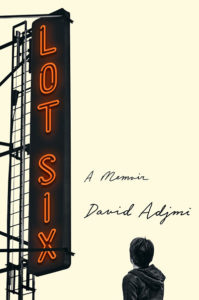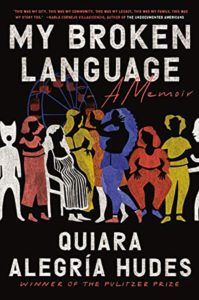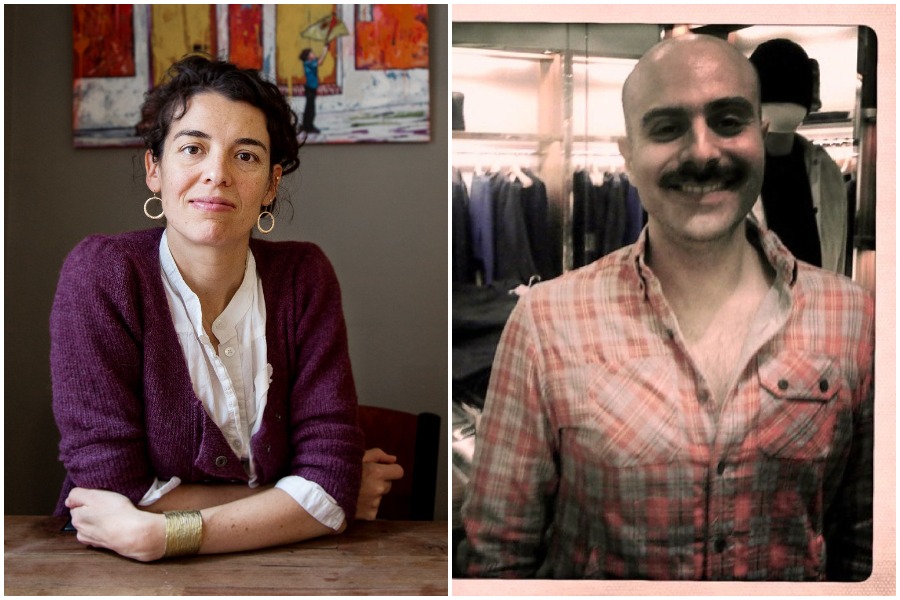In David Adjmi’s new memoir, Lot Six, he is having lunch with his mother when she asks him a question about the play he wrote, his breakout hit, Stunning.
“The girl in the play…is that me?” she asks.
“Her life wasn’t grand or important, which was why she couldn’t see those works of art in museums as having anything to do with her,” writes Adjmi. “Because her life never mattered, she was a woman without a story. I was the inheritor of that non-story. I believed my life was meaningless, that I was worthless in the eyes of the world. But maybe the task of my life was to make a story, so I could give it to her—like one of those sword-bearing travelers from mythology, returning back home bearing a gift.”

To be a playwright of color in America is to be saddled with contradictory expectations of multiple communities: You must write authentically, but you must also be able to sell tickets to older white subscribers. You must write about the community you came from, but not make it so alien that white audiences won’t understand it. And writing about a community that has never been portrayed in depth before is its own challenge: You want to tell the truth, but you don’t want to stereotype or belittle the community to a primarily white audience. As a writer, you might feel the tension of wanting to fit into the mainstream and assimilate, while also wanting to carve out a place in society where you can be your authentic self.
Both Adjmi and playwright Quiara Alegría Hudes have new memoirs out; hers is My Broken Language. What both books make clear is that for playwrights from communities outside the predominantly white mainstream, to create their art they must first figure out who they are. They must find their identity and become comfortable with it. Only then can they truly create something truthful, real, and transcendent.
Both memoirs describe a process of searching, but the search is not for that great piece of art or that breakout hit (Hudes’s memoir doesn’t even mention the Broadway musical In the Heights or her Pulitzer-winning Water by the Spoonful). Instead, both books can are less the story of How I became a playwright, and more How I found myself. Both are moving in their vulnerability and honesty about the path to artistry, which can be tough, winding, full of false starts, pain, and maybe the occasional nervous breakdown. Yet they are beacons for anyone who has had difficulty finding their voice and embracing it.
“My life required explication, and I didn’t have the language to make it make sense,” Hudes writes in My Broken Language, referring to the cultural practices and ways of living that were so familiar to her but mystified her white friends. “I yearned for a home that required no explanation.”
Both Adjmi and Hudes grew up in that liminal space between cultures. He grew up in a religious Syrian Jewish community in Brooklyn, among a family who were almost outcasts in that world because they were poorer in a largely affluent community. He was also growing up gay in the 1980s, making him an outsider not only in his Syrian Jewish neighborhood but also in mainstream America.

Hudes was the daughter of a white Jewish man and a Puerto Rican woman. She lived a part of her law in the Pennsylvania suburb of Malvern, where her white classmates said her name sounded “ugly.” When her parents separated, she lived with her mom in the Puerto Rican neighborhood of North Philly, surrounded by her grandmother, aunts, uncles, cousins, a place where “Spanish surfed on bus fumes—crashing on every corner and through open windows.” Hudes’s description of the Philadelphia environment she grew up in is so rich in detail, you can almost taste it.
Indeed these two books aren’t just explorations of their respective artist’s lives. They are also portraits of communities. Whereas Admji is more critical of the orthodox, judgmental environment he grew up in, Hudes takes the opposite approach, writing about the women in her family with reverence and love. She describes her cousin Nuchi Perez as having a “booty [that] tested the limit of spandex…her imposing frame seemed to be in the living room, dining room, and kitchen all at once.” While the richness of this language renders Nuchi vivid and alive, much as in her plays, Hudes brings us up short with what follows: “Two years later, addiction would render her skeletal. She would become a walking dagger.” We get to know the women in Hudes’s family so intimately that we hurt along with her when tragedy befalls some of them.
When Hudes is describing the women she grew up around, her writing truly shines. And those parts of the memoir makes it clear why Hudes has devoted her career to shining a light on Latinx women, and basing the Elliot trilogy—Elliot: A Soldier’s Fugue, Water by the Spoonful, and The Happiest Song Plays Last—on her family. There’s a rich history here, of a people whom society would rather overlook and forget, because they are too poor and too brown, and don’t speak English the way mainstream America wants them to speak it. But they deserve their spot in the American theatrical canon as surely as the characters in Arthur Miller’s Death of a Salesman, a play Hudes rightly skewers in her memoir.
“Loman was sure some throne was his birthright; when it eluded him he grew disconnected, disconsolate,” Hudes writes. “All these literary patriarchs paraded their woe like it was some main event. Hamlet brooded, Romeo beat his chest, Willy went mad. Why didn’t they dance like the Perez women? … No billboards or sitcoms had declared my Perez cousins queens, and I now saw freedom in this. No false thrones, just the shitstorms of life. Grab a shovel and sing a work song. Build a throne that’s real.”
Fans of Hudes’s plays will be disappointed to find that her memoir doesn’t touch those works. It ends instead with her graduation from Brown University. I would have loved to read more about Hudes’s writing process, how she discovered that theatre was her primary vehicle—and her subsequent disappointment in the industry.
There’s a section about how Hudes conceived and then wrote an original salsa musical at Yale (including the music), a moment that comes so out of left field that I had to flip back a few pages to make sure I didn’t miss something. Why a musical? Why an interactive medium like theatre? And why hasn’t anyone yet produced Sweat of the River, Seat of the Ocean?
Perhaps Hudes is leaving this for a sequel, which I hope she does—not only because I want to read more about how she wrote her most well-known works, but because I just want to spend more time in Hudes’s personal, multilingual, melodic world.
“My life required explication, and I didn’t have the language to make it make sense. I yearned for a home that required no explanation.”
If Hudes’s book is a more impressionistic take on the memoir—it’s not exactly a linear tale, and she frequently interrupts a memory with a present-day aside—Adjmi’s, by contrast, is a more traditionally structured coming-of-age, about a boy who grows up in an unloving, dysfunctional environment and the ramifications that has on his adult life and his career.
Lot Six starts off strong with a memory of Adjmi’s mother taking him to see his first Broadway musical Sweeney Todd. Knowing that the Demon Barber was Admji’s introduction to theatre explains a lot about Adjmi’s aesthetic: dark, filled with unlikeable people but insanely watchable. Indeed, to read his book is to spend time with a family whose individual members are dealing with their own demons, so much so that they couldn’t look after their youngest member.
“I learned to care for myself,” Adjmi writes about his 9-year-old self, during the period when his parents separated. “I bathed infrequently, checked my own homework. I taught myself to cook using whatever ingredients I found in the cabinet; I made my odd decoctions with Wesson oil and garbanzo beans and red-wine vinegar.” This early section is heartbreaking and honest in its details of neglect. But it’s also compassionate; Adjmi doesn’t blame his family or judge them. Adjmi approaches them with a playwright’s eye: They’re not the best people, but they’re fully rendered, messy, complicated people.
The memoir lags a bit in the middle, during his high school and college years: the classmates he writes about, the women he dates, and the men he secretly hooks up are not as fully rendered as his family members. His interactions with them are less illuminations of his character or theirs, and more like displays of old wounds. These figures leave the memoir as quickly as they came.
The memoir picks up steam again when Adjmi begins his playwriting journey at the Iowa Writers Workshop, then at Juilliard. What Lot Six does brilliantly in its last third is viscerally convey the angst of what happens when you don’t believe the mainstream will embrace your authentic self even as you’re finding it, and the struggle to write what you think other people want from you.
Adjmi writes that he suffered from writer’s block for years, because “the prospect of writing my truth terrified me…I was a Lot Six: a freak and an oddity. Who would want my truth? No one.” (“Lots” were units of negotiation among businessmen in his Syrian Jewish community, and “Lot Six” was code for an odd or “queer” number—“a price tag” marking “no value.”)
Hudes’s memoir is strong on this point too: conveying how scary writing can be because of what it reveals about the writer, a fear only magnified by the anxiety that other people will actually see you for who you are.
Hudes ends one of the plays she wrote at Brown with her main character, a woman, surrounded by a group of men who had been harassing and chasing her throughout the play. The final line of the play: “I AM A WHORE.” Hudes writes about how she felt stripped bare by the play. “I began to hate the play, not because it was good or bad, but because it unmasked me without permission,” she wrote. “The fire gave me truth even if it burned me.”
Similarly, Adjmi describes writing Stunning, about a Syrian Jewish woman who falls in love with an African American woman, only to have her family threaten to disown her. “Since I knew no one would ever see it, the block around my writing lifted,” Adjmi recalls. “The writing was intensely cathartic—I sobbed uncontrollably writing the end, the way I sobbed watching Six Degrees of Separation or Streetcar. I cried for my characters and my family and the whole brutal, broken world.” It is only when he stops trying to live up to other people’s expectations and create for himself that Adjmi becomes truly free.
Or, as Hudes puts it, paraphrasing her playwriting teacher Paula Vogel (whose cameo in the book made me scream with joy): “No single hemisphere or address wore an aesthetic crown….The task was to put one’s world onstage.”
Diep Tran (she/her) is a former senior editor of this magazine. She is currently the managing editor of VietFactCheck, a bilingual misinformation education project for the Vietnamese American community that has been featured in The New York Times, Vox, and NPR.


